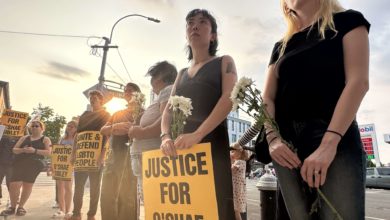On Nov. 6, millions of people around the country cast votes on pieces of legislation that would greatly affect the daily lives of working people in each state.
From a socialist perspective, state referendums are not, as the ruling class claims, the ultimate expressions of democracy. Such political contests take place in an environment in which the media is privately controlled, and capitalists often contribute enormous sums of money to popularize the side that serves their interests. Historically, state referendums and ballot initiatives have been more a vehicle for reactionary politics than progressive politics.
This year, however, the right wing lost ballot initiatives in many states.
Marriage equality victories
Maine, Maryland, Minnesota and Washington State all achieved civil rights victories for the LGBT community when the states showed their majority support for marriage equality. These victories came only after and because of an arduous struggle of LGBT people and their allies in each state and around the country.
In March 2012 the Civil Marriage Protection Act was enacted in Maryland, allowing same-sex couples to obtain civil marriage licenses in the state beginning in January 2013. This prompted a referendum led by reactionary racist tea-party forces to stop the law.
Marylanders for Marriage Equality, Equality Maryland, the ANSWER Coalition (Act Now to Stop War and End Racism) and many other groups launched a spirited campaign to get the word out about the issue and to fight for civil rights. At the polls, Marylanders made it clear that they would no longer accept inequality in their state, becoming one of the first states along with Maine and Washington to win the victory by popular vote.
Same-sex marriage has come to a popular vote 32 times in the past: 30 anti-equality Constitutional amendments like the one in Minnesota, the 2009 referendum in Maine and the bigoted Proposition 8 in California. All 32 were negative outcomes, where the anti-equality measures passed by popular vote. In 2012, however, the LGBT movement won victories in four states at the same time. One of those states, Maine, can be seen as an example of a national shift in popular mobilization on same-sex marriage since the majority electorate there switched its vote on same-sex marriage within 3 years.
The majority of people in the United States supporting marriage equality grows every single day. A CNN poll earlier this year showed that, since 2009, popular support for same-sex marriage has increased by nearly 25 percent. In each of the four states that had marriage equality victories this year, younger voters were considerably more likely to support equality. Marriage equality campaigns in each state were able to raise and spend more than their more conservative, older opponents. Exit polls showed that marriage equality was even more popular among Latino voters than among the general population—proving false the common rhetoric that aims to divide oppressed communities.
Nationally, same-sex couples will soon be able to marry in nine states and the District of Columbia. This is still a very small percentage of the country, but these victories will undoubtedly fuel the struggle for marriage equality in other states, particularly those that already have civil unions.
Racist Voter ID laws
The marriage amendment to the constitution was not the only piece of reactionary legislation that Minnesotans rejected. Right-wing forces also pushed a constitutional amendment that would have required all voters to possess a government-issued photo ID, tightening eligibility requirements. Sold as a way to prevent fraud, the amendment was in fact a racist disenfranchisement scheme.
A 2011 poll showed 80 percent of respondents were favorable to the amendment, but thanks to a popular education campaign about its implication it failed by more than 214,000 votes.
Similar efforts to intimidate and disenfranchise voters took place elsewhere in the Midwest. In October, billboards were erected throughout low-income and oppressed communities in Cleveland and Milwaukee that warned of stiff penalties for voter fraud, containing images of a judge’s gavel and warning that voter fraud is a felony punishable by up to three and a half years in prison and a $10,000 fine.
Understanding that these billboards aimed to intimidate Black and Latino people, ex-prisoners eligible to vote and the poor, people across the country fought back. Not only did they have the signs removed, but Clear Channel Communications, who owns the billboards, donated space with a new message stating: “Voting is a Right. Not a Crime!”
Defeating the anti-women bigots in Florida
In Florida, voters struck back at lawmakers attempting to limit the freedom of choice of women in the state. A constitutional amendment sought to restrict state funding for abortion, despite the fact that such state funding does not exist. The amendment also sought to end the privacy rights of teenage women seeking to terminate a pregnancy. Under current state law, an underage woman does not need parental consent to obtain abortion services.
The defeat of Amendment 6 is especially poignant considering it emerged from an election that was plagued with anti-woman vitriol and misogyny. In the months and years leading up to this election, right-wing bigots put up literally thousands of pieces of legislation attacking abortion rights and social services. Right-wing politicians and pundits across the country attempted to redefine rape in an attempt to dismiss the seriousness of violence against women and further restrict abortion access. In Florida, women in particular struck back.
Immigrant rights: one victory, one defeat
There was also a major victory for immigrant rights at the polls in the state of Maryland, where the state DREAM Act was passed. This law would allow undocumented high school students who have attended high school in Maryland to apply for in-state tuition if they are accepted to a public college in Maryland and meet other criteria. They need to have attended high school in Maryland for at least three years, and have parents who paid Maryland taxes during this period.
Originally passed in April 2011, the law did not go into effect because of a referendum led by racist tea-party forces. For 18 months, progressives around Maryland gathered and waged a militant fight back movement to garner support for the DREAM Act. Members of the ANSWER Coalition initiated the “Defend the Maryland Dream Act” campaign, and worked with activists, union groups, student organizations and thousands of other individuals in holding protests, street meetings, and information sessions to get the word out.
The efforts of Marylanders in this struggle for immigrant rights paid off in a big way, with the DREAM Act passing at nearly 60 percent. The defenders of the DREAM Act also formed a united front with the marriage equality groups.
Unfortunately, Montana passed an act that will have painful and far-reaching implications for its residents. Montana’s LR-121 requires proof of citizenship of all people seeking state services including disability benefits, licenses, employment, and services for crime victims. The inhumane measure specifically targets undocumented workers, and will also restrict needed services for many Montanans in desperate need, including survivors of domestic violence.
The law creates an enormously expensive verification system—just to deny people more benefits. According to the ACLU, “a study conducted by the federal General Accounting Office of six states using these verification databases found that costs totaled $16.6 million, yet found only eight unauthorized immigrants. Meanwhile, thousands of U.S. citizens were denied Medicaid or had their benefits delayed.”
Mixed results, but progressive tilt
In California, voters rejected a measure that would have required unions to hand-collect dues from members if the dollars were to be used in politics. Teachers unions in South Dakota and Idaho fought off laws that would have stripped teachers’ paths to tenure and damaged their collective bargaining rights.
While there were other reactionary ballot initiatives that succeeded, the overall trend shows a shift in the political involvement and demands of working people. This shift reflects the changing composition of the electorate, and the impact on consciousness of the defensive and offensive struggles that have been waged in recent years for LGBT rights, immigrant rights and against racist Voter ID laws.
Many of the limited gains of this election must be expanded, and given the current system, are always at risk of being reversed. A people’s movement cannot tie its victories to a rigged electoral system. It must intensify its struggle between election cycles, continuing to fight in the streets, in our neighborhoods, schools and workplaces.






